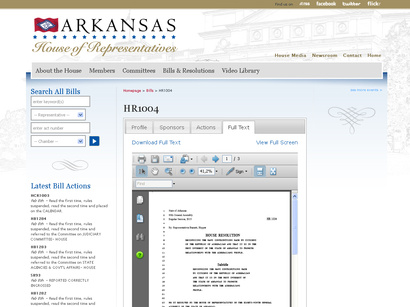U.S. state of Arkansas recognizes Khojaly genocide

By Sara Rajabova
Arkansas has become another U.S. state to recognize the Khojaly genocide committed against Azerbaijanis by Armenians during the 1990s war.
Following the states of New Mexico, Texas, New Jersey, Georgia and Maine, the Arkansas House of Representatives announced last Friday that it had recognized the Khojaly events as an act of genocide. The draft resolution on the Khojaly massacre was submitted to the agenda of the House of Representatives by its members Jonathan Barnett and Karen Hopper.
The document notes that the armed forces of Armenia and Russian troops captured Khojaly -- a town in Azerbaijan's Nagorno-Karabakh region -- on February 25-26, 1992. The Azerbaijani population was subject to massive annihilation, in which up to a thousand people were killed, with most of the victims being women and children.
"The massacre was reported by major news organizations and has been viewed by the Human Rights Watch as a violation of customary law regarding the treatment of civilians in war zones, and numerous governments around the world have condemned the attack," it said.
The Khojaly genocide was earlier recognized by the parliaments of Turkey, Pakistan and Mexico.
Furthermore, the Khojaly tragedy was recognized as an act of genocide and crime against humanity at the 12th session of the Islamic Summit Conference, the highest body of the Organization of Islamic Cooperation, held with the participation of OIC leaders in Cairo on February 2-7.
The town of Khojaly was situated within the administrative borders of the Nagorno-Karabakh region of Azerbaijan. Its population constituted over 7,000 people. Because of its communication advantage of having a civilian airport, just before the start of Nagorno-Karabakh conflict it had become a shelter for refugee Meskhet Turks who fled the bloody inter-ethnic clashes in Central Asia as well as Azerbaijani refugees deported from Armenia.
Late into the night of February 25, 1992, the town came under intensive fire from the town of Khankendi and Askeran already occupied by Armenian forces. At night the Armenian armed forces supported by the ex-Soviet 366th regiment completed the surrounding of the town already isolated due to ethnic cleansing of the Azerbaijani population of its neighboring regions. The joint forces occupied the town, which was ruined by heavy artillery shelling.
In just a few hours, 613 civilians were killed, including 106 women, 70 elderly and 83 children in Khojaly on that bloody night. A total of 1,000 civilians were disabled. 56 people were killed with outrageous brutality, eight families were totally exterminated, and 25 children lost both parents, while 130 children lost at least one parent, in what became the most brutal crackdown on civilians during the three years of the conflict's military phase. Moreover, 1,275 innocent people were taken hostage, while the fate of 150 remains unknown.
The Nagorno-Karabakh conflict emerged in 1988 when Armenia made territorial claims against Azerbaijan. Since the lengthy war that displaced over one million Azerbaijanis, Armenian armed forces have occupied over 20 percent of Azerbaijan's internationally recognized territory, including Nagorno-Karabakh and seven adjacent regions. The UN Security Council has adopted four resolutions on Armenia's withdrawal from the Azerbaijani territory, but Armenia has not followed them to this day.
Here we are to serve you with news right now. It does not cost much, but worth your attention.
Choose to support open, independent, quality journalism and subscribe on a monthly basis.
By subscribing to our online newspaper, you can have full digital access to all news, analysis, and much more.
You can also follow AzerNEWS on Twitter @AzerNewsAz or Facebook @AzerNewsNewspaper
Thank you!
